formerly eScholarship Editions


|
|
|
|
Your request for similar items found 20 book(s). | Modify Search | Displaying 1 - 20 of 20 book(s) | |
| 1. |  | Title: What price better health?: hazards of the research imperative Author: Callahan, Daniel 1930- Published: University of California Press, 2003 Subjects: Medicine | Philosophy | Public Policy Publisher's Description: The idea that we have an unlimited moral imperative to pursue medical research is deeply rooted in American society and medicine. In this provocative work, Daniel Callahan exposes the ways in which such a seemingly high and humane ideal can be corrupted and distorted into a harmful practice. Medical research, with its power to attract money and political support, and its promise of cures for a wide range of medical burdens, has good and bad sides - which are often indistinguishable. In What Price Better Health?, Callahan teases out the distinctions and differences, revealing the difficulties that result when the research imperative is suffused with excessive zeal, adulterated by the profit motive, or used to justify cutting moral corners. Exploring the National Institutes of Health's annual budget, the inflated estimates of health care cost savings that result from research, the high prices charged by drug companies, the use and misuse of human subjects for medical testing, and the controversies surrounding human cloning and stem cell research, Callahan clarifies the fine line between doing good and doing harm in the name of medical progress. His work shows that medical research must be understood in light of other social and economic needs and how even the research imperative, dedicated to the highest human good, has its limits. [brief] Similar Items |
| 2. |  | Title: The activist's handbook: a primer for the 1990s and beyond Author: Shaw, Randy 1956- Published: University of California Press, 1996 Subjects: Politics | Sociology | California and the West | Urban Studies | American Studies | Public Policy Publisher's Description: The Activist's Handbook is a hard-hitting guide to winning social change in the 1990s. Randy Shaw, attorney and longtime activist for urban issues, shows how positive change can still be accomplished despite an increasingly grim political order, if activists employ the strategies set forth in this desperately needed primer.Inspiring "fear and loathing" in politicians, building diverse coalitions, and harnessing the media, the courts, and the electoral process to one's cause are only some of the key tactics Shaw advocates and explains. Central to all social-change activism, Shaw shows, is being proactive: rather than simply reacting to right-wing proposals, activists must develop an agenda and focus their resources on achieving it. The Activist's Handbook details the impact of specific strategies on campaigns across the country: battles over homelessness, the environment, AIDS policies, neighborhood preservation, and school reform among others. Though activist groups can have widely different aims, similar tactics are shown to produce success.Further, the book offers a sophisticated analysis of the American power structure by someone on the front lines. In showing how people can and must make a difference at both local and national levels, this is an indispensable guide not only for activists, but for everyone interested in the future of progressive politics in America. [brief] Similar Items |
| 3. | 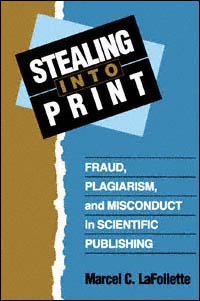 | Title: Stealing into print: fraud, plagiarism, and misconduct in scientific publishing Author: LaFollette, Marcel C. (Marcel Chotkowski) Published: University of California Press, 1992 Subjects: Media Studies | History and Philosophy of Science | Print Media | Public Policy | Science Publisher's Description: False data published by a psychologist influence policies for treating the mentally retarded. A Nobel Prize-winning molecular biologist resigns the presidency of Rockefeller University in the wake of a scandal involving a co-author accused of fabricating data. A university investigating committee declares that almost half the published articles of a promising young radiologist are fraudulent.Incidents like these strike at the heart of the scientific enterprise and shake the confidence of a society accustomed to thinking of scientists as selfless seekers of truth. Marcel LaFollette's long-awaited book gives a penetrating examination of the world of scientific publishing in which such incidents of misconduct take place. Because influential scientific journals have been involved in the controversies, LaFollette focuses on the fragile "peer review" process - the editorial system of seeking pre-publication opinions from experts. She addresses the cultural glorification of science, which, combined with a scientist's thirst for achievement, can seem to make cheating worth the danger. She describes the great risks taken by the accusers - often scholars of less prestige and power than the accused - whom she calls "nemesis figures" for their relentless dedication to uncovering dishonesty.In sober warning, LaFollette notes that impatient calls from Congress, journalists, and taxpayers for greater accountability from scientists have important implications for the entire system of scientific research and communication.Provocative and learned, Stealing Into Print is certain to become the authoritative work on scientific fraud, invaluable to the scientific community, policy makers, and the general public. [brief] Similar Items |
| 4. |  | Title: A scientist's voice in American culture: Simon Newcomb and the rhetoric of scientific method Author: Moyer, Albert E 1945- Published: University of California Press, 1992 Subjects: History | History and Philosophy of Science | United States History Publisher's Description: In late nineteenth-century America, Simon Newcomb was the nation's most celebrated scientist and - irascibly, doggedly, tirelessly - he made the most of it. Officially a mathematical astronomer heading a government agency, Newcomb spent as much of his life out of the observatory as in it, acting as a spokesman for the nascent but restive scientific community of his time.Newcomb saw the "scientific method" as a potential guide for all disciplines and a basis for all practical action, and argued passionately that it was of as much use in the halls of Congress as in the laboratory. In so doing, he not only sparked popular support for American science but also confronted a wide spectrum of social, cultural, and intellectual issues. This first full-length study of Newcomb traces the development of his faith in science and ranges over topics of great public debate in the Gilded Age, from the reform of economic theory to the recasting of the debate between science and religion. Moyer's portrait of a restless, eager mind also illuminates the bustle of late nineteenth-century America. [brief] Similar Items |
| 5. | 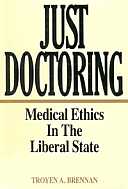 | Title: Just doctoring: medical ethics in the liberal state Author: Brennan, Troyen A Published: University of California Press, 1991 Subjects: Philosophy | Ethics | Medicine Publisher's Description: Just Doctoring draws the doctor-patient relationship out of the consulting room and into the middle of the legal and political arenas where it more and more frequently appears. Traditionally, medical ethics has focused on the isolated relationship of physician to patient in a setting that has left the physician virtually untouched by market constraints or government regulation. Arguing that changes in health care institutions and legal attention to patient rights have made conventional approaches obsolete, Troyen Brennan points the way to a new, more aware and engaged medical ethics.The medical profession is no longer isolated, even theoretically, from the liberal, market-dominated state. Old ideas of physician beneficence and altruism must make way for a justice-based medical ethics, assuming a relationship between equals more compatible with liberal political philosophy. Brennan offers clinical examples of many of today's most challenging medical problems - from informed consent to care rationing and the repercussions of the HIV epidemic - and gives his recommendation for a new ethical perspective. This lively and controversial plea for a rethinking of medical ethics goes right to the heart of medical care at the end of the twentieth century. [brief] Similar Items |
| 6. | 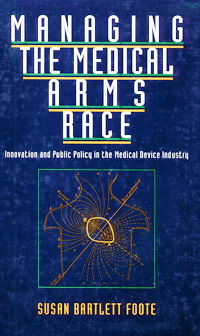 | Title: Managing the medical arms race: public policy and medical device innovation Author: Foote, Susan Bartlett Published: University of California Press, 1992 Subjects: Politics | Medicine | Public Policy | Economics and Business Publisher's Description: The allure of medical innovation is powerful - it holds out the promise of perfect health, the end of pain, the deferral of death. Our insatiable appetite for costly new technologies, fed by a profusion of innovations and the profits they generate, has led to what has been dubbed the medical arms race. During the last several decades government has been called upon to manage the escalation of this race.Foote has written the first comprehensive examination of the profound influence of government policies on medical innovation. She explains how these policies have proliferated to affect every stage of the innovative process in medical device technology - from the first research idea to the patient's bedside. Drawing on case studies of technologies as diverse as lasers, cardiac pacemakers, CT scanners, and IUDs, she traces the interaction between the industry and government institutions, including the National Institutes of Health, the FDA, and the Medicare and Medicaid programs.Public policies during the 1950s and 1960s, Foote discovers, tended to promote innovation, while the regulation and cost controls of the 1970s and 1980s began to inhibit it. For the 1990s and beyond she proposes incremental policy improvements that will rationalize and streamline government intervention. She cautions that we must recognize the limits of medical technology and public policy to cure all ills.Medical innovation is a crucial part of health care reform, a subject of increasing complexity and controversy. Written clearly and accessibly, Managing the Medical Arms Race is an invaluable source for medical, industry, and policy professionals, but it also has much to say to anybody concerned with how we as a society choose to take care of our health. [brief] Similar Items |
| 7. | 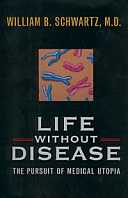 | Title: Life without disease: the pursuit of medical utopia Author: Schwartz, William B 1922- Published: University of California Press, 1998 Subjects: Science | Medicine | Economics and Business | History and Philosophy of Science | Public Policy Publisher's Description: The chaotic state of today's health care is the result of an explosion of effective medical technologies. Rising costs will continue to trouble U.S. health care in the coming decades, but new molecular strategies may eventually contain costs. As life expectancy is dramatically extended by molecular medicine, a growing population of the aged will bring new problems. In the next fifty years genetic intervention will shift the focus of medicine in the United States from repairing the ravages of disease to preventing the onset of disease. Understanding the role of genes in human health, says Dr. William B. Schwartz, is the driving force that will change the direction of medical care, and the age-old dream of life without disease may come close to realization by the middle of the next century. Medical care in 2050 will be vastly more effective, Schwartz maintains, and it may also be less expensive than the resource-intensive procedures such as coronary bypass surgery that medicine relies on today.Schwartz's alluring prospect of a medical utopia raises urgent questions, however. What are the scientific and public policy obstacles that must be overcome if such a goal is to become a reality? Restrictions on access imposed by managed care plans, the corporatization of charitable health care institutions, the increasing numbers of citizens without health insurance, the problems with malpractice insurance, and the threatened Medicare bankruptcy - all are the legacy of medicine's great progress in mastering the human body and society's inability to assimilate that mastery into existing economic, ethical, and legal structures. And if the average American life span is 130 years, a genuine possibility by 2050, what social and economic problems will result?Schwartz examines the forces that have brought us to the current health care state and shows how those same forces will exert themselves in the decades ahead. Focusing on the inextricable link between scientific progress and health policy, he encourages a careful examination of these two forces in order to determine the kind of medical utopia that awaits us. The decisions we make will affect not only our own care, but also the system of care we bequeath to our children. [brief] Similar Items |
| 8. |  | Title: The Research foundations of graduate education: Germany, Britain, France, United States, Japan Author: Clark, Burton R Published: University of California Press, 1993 Subjects: Sociology | Education Publisher's Description: A powerful international roster of scholars presents the first comprehensive discussion of advanced education in Germany, Britain, France, Japan, and the United States. For each nation, a detailed overview of the historical development and current conditions of graduate education is followed by an a . . . [more] Similar Items |
| 9. | 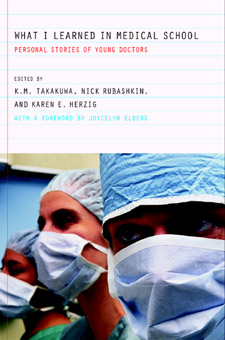 | Title: What I learned in medical school: personal stories of young doctors Author: Takakuwa, Kevin M Published: University of California Press, 2004 Subjects: Medicine | Sociology | Ethnic Studies | Gender Studies | Anthropology | Health Care Publisher's Description: Like many an exclusive club, the medical profession subjects its prospective members to rigorous indoctrination: medical students are overloaded with work, deprived of sleep and normal human contact, drilled and tested and scheduled down to the last minute. Difficult as the regimen may be, for those who don't fit the traditional mold - white, male, middle-to-upper class, and heterosexual - medical school can be that much more harrowing. This riveting book tells the tales of a new generation of medical students - students whose varied backgrounds are far from traditional. Their stories will forever alter the way we see tomorrow's doctors. In these pages, a black teenage mother overcomes seemingly insurmountable odds, an observant Muslim dons the hijab during training, an alcoholic hides her addiction. We hear the stories of an Asian refugee, a Mexican immigrant, a closeted Christian, an oversized woman - these once unlikely students are among those who describe their medical school experiences with uncommon candor, giving a close-up look at the inflexible curriculum, the pervasive competitive culture, and the daunting obstacles that come with being "different" in medical school. Their tales of courage are by turns poignant, amusing, eye-opening - and altogether unforgettable. [brief] Similar Items |
| 10. | 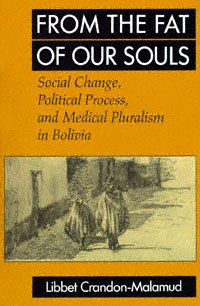 | Title: From the fat of our souls: social change, political process, and medical pluralism in Bolivia Author: Crandon-Malamud, Libbet Published: University of California Press, 1991 Subjects: Anthropology | Latin American Studies | Politics | Medical Anthropology | Medicine Publisher's Description: From the Fat of Our Souls offers a revealing new perspective on medicine, and the reasons for choosing or combining indigenous and cosmopolitan medical systems, in the Andean highlands. Closely observing the dialogue that surrounds medicine and medical care among Indians and Mestizos, Catholics and Protestants, peasants and professionals in the rural town of Kachitu, Libbet Crandon-Malamud finds that medical choice is based not on medical efficacy but on political concerns. Through the primary resource of medicine, people have access to secondary resources, the principal one being social mobility. This investigation of medical pluralism is also a history of class formation and the fluidity of both medical theory and social identity in highland Bolivia, and it is told through the often heartrending, often hilarious stories of the people who live there. [brief] Similar Items |
| 11. |  | Title: Places of inquiry: research and advanced education in modern universities Author: Clark, Burton R Published: University of California Press, 1995 Subjects: Social Science | Sociology | Education Publisher's Description: A distinguished work by one of America's leading scholars of higher education, Places of Inquiry explores one of the major issues in university education today: the relationship among research, teaching, and study. Based on cross-national research on the university systems of Germany, Britain, France, the United States, and Japan - which was first reported in the edited volume The Research Foundations of Graduate Education (California, 1993) - this book offers in-depth comparative analysis and draws provocative conclusions about the future of the research-teaching-study nexus.With characteristic clarity and vision, Burton R. Clark identifies the main features and limitations of each national system: governmental and industrial dominance in Japan, for example, and England's collegiate form of university. He examines the forces drawing research, teaching, and study apart and those binding them together. Highlighting the fruitful integration of teaching and research in the American graduate school, Clark decries the widely held view that these are antithetical activities. Rather, he demonstrates that research provides a rich basis for instruction and learning. Universities, he maintains, are places of inquiry, and the future lies with institutions firmly grounded in this belief. [brief] Similar Items |
| 12. | 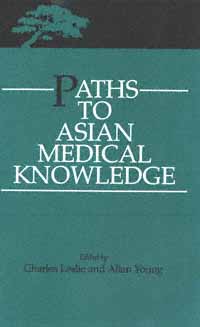 | Title: Paths to Asian medical knowledge Author: Leslie, Charles M 1923- Published: University of California Press, 1992 Subjects: Anthropology | Medical Anthropology | Asian Studies Publisher's Description: Like its classic predecessor, Asian Medical Systems , Paths to Asian Medical Knowledge significantly expands the study of Asian medicine. These essays ask how patients and practitioners know what they know - what evidence of disease or health they consider convincing and what cultural traditions and symbols guide their thinking. Whether discussing Japanese anatomy texts, Islamic humoralism, Ayurvedic clinical practice, or a variety of other subjects, the authors offer an exciting range of information and suggest new theoretical avenues for medical anthropology. [brief] Similar Items |
| 13. | 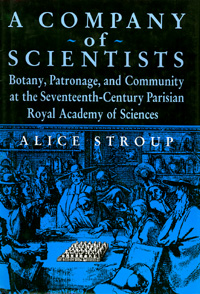 | Title: A company of scientists: botany, patronage, and community at the Seventeenth-century Parisian Royal Academy of Sciences Author: Stroup, Alice Published: University of California Press, 1990 Subjects: History | History and Philosophy of Science | European History Publisher's Description: Who pays for science, and who profits? Historians of science and of France will discover that those were burning questions no less in the seventeenth century than they are today. Alice Stroup takes a new look at one of the earliest and most influential scientific societies, the Académie Royale des Sciences. Blending externalist and internalist approaches, Stroup portrays the Academy in its political and intellectual contexts and also takes us behind the scenes, into the laboratory and into the meetings of a lively, contentious group of investigators.Founded in 1666 under Louis XIV, the Academy had a dual mission: to advance science and to glorify its patron. Creature of the ancien régime as well as of the scientific revolution, it depended for its professional prestige on the goodwill of monarch and ministers. One of the Academy's most ambitious projects was its illustrated encyclopedia of plants. While this work proceeded along old-fashioned descriptive lines, academicians were simultaneously adopting analogical reasoning to investigate the new anatomy and physiology of plants. Efforts to fund and forward competing lines of research were as strenuous then as now. We learn how academicians won or lost favor, and what happened when their research went wrong. Patrons and members shared in a new and different kind of enterprise that may not have resembled the Big Science of today but was nevertheless a genuine "company of scientists." [brief] Similar Items |
| 14. | 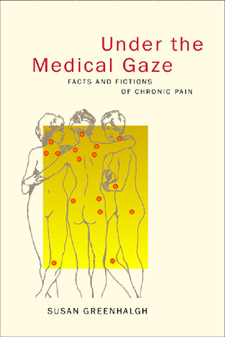 | Title: Under the medical gaze: facts and fictions of chronic pain Author: Greenhalgh, Susan Published: University of California Press, 2001 Subjects: Anthropology | Folklore and Mythology | Medical Anthropology | Physical Anthropology | Cultural Anthropology | Medicine | Gender Studies | Sociology | Social Problems | Social Problems Publisher's Description: This compelling account of the author's experience with a chronic pain disorder and subsequent interaction with the American health care system goes to the heart of the workings of power and culture in the biomedical domain. It is a medical whodunit full of mysterious misdiagnosis, subtle power plays, and shrewd detective work. Setting a new standard for the practice of autoethnography, Susan Greenhalgh presents a case study of her intense encounter with an enthusiastic young specialist who, through creative interpretation of the diagnostic criteria for a newly emerging chronic disease, became convinced she had a painful, essentially untreatable, lifelong muscle condition called fibromyalgia. Greenhalgh traces the ruinous effects of this diagnosis on her inner world, bodily health, and overall well-being. Under the Medical Gaze serves as a powerful illustration of medicine's power to create and inflict suffering, to define disease and the self, and to manage relationships and lives. Greenhalgh ultimately learns that she had been misdiagnosed and begins the long process of undoing the physical and emotional damage brought about by her nearly catastrophic treatment. In considering how things could go so awry, she embarks on a cogent and powerful analysis of the sociopolitical sources of pain through feminist, cultural, and political understandings of the nature of medical discourse and practice in the United States. She develops fresh arguments about the power of medicine to medicalize our selves and lives, the seductions of medical science, and the deep, psychologically rooted difficulties women patients face in interactions with male physicians. In the end, Under the Medical Gaze goes beyond the critique of biomedicine to probe the social roots of chronic pain and therapeutic alternatives that rely on neither the body-cure of conventional medicine nor the mind-cure of some alternative medicines, but rather a broader set of strategies that address the sociopolitical sources of pain. [brief] Similar Items |
| 15. |  | Title: The research universities and their patrons Author: Rosenzweig, Robert M Published: University of California Press, 1982 Subjects: Sociology | Sociology Similar Items |
| 16. | 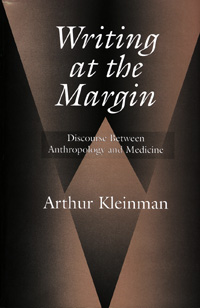 | Title: Writing at the margin: discourse between anthropology and medicine Author: Kleinman, Arthur Published: University of California Press, 1997 Subjects: Anthropology | Medical Anthropology | Sociology | Medicine | Asian Studies | Social Problems Publisher's Description: One of the most influential and creative scholars in medical anthropology takes stock of his recent intellectual odysseys in this collection of essays. Arthur Kleinman, an anthropologist and psychiatrist who has studied in Taiwan, China, and North America since 1968, draws upon his bicultural, multidisciplinary background to propose alternative strategies for thinking about how, in the postmodern world, the social and medical relate. Writing at the Margin explores the border between medical and social problems, the boundary between health and social change. Kleinman studies the body as the mediator between individual and collective experience, finding that many health problems - for example the trauma of violence or depression in the course of chronic pain - are less individual medical problems than interpersonal experiences of social suffering. He argues for an ethnographic approach to moral practice in medicine, one that embraces the infrapolitical context of illness, the responses to it, the social institutions relating to it, and the way it is configured in medical ethics.Previously published in various journals, these essays have been revised, updated, and brought together with an introduction, an essay on violence and the politics of post-traumatic stress disorder, and a new chapter that examines the contemporary ethnographic literature of medical anthropology. [brief] Similar Items |
| 17. | 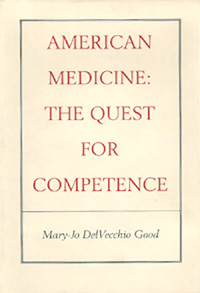 | Title: American medicine: the quest for competence Author: Good, Mary-Jo DelVecchio Published: University of California Press, 1995 Subjects: Medicine | Science | Medical Anthropology | Public Policy Publisher's Description: What does it mean to be a good doctor in America today? How do such challenges as new biotechnologies, the threat of malpractice suits, and proposed health-care reform affect physicians' ability to provide quality care?These and many other crucial questions are examined in this book, the first to fully explore the meaning and politics of competence in modern American medicine. Based on Mary-Jo DelVecchio Good's recent ethnographic studies of three distinct medical communities - physicians in rural California, academics and students involved in Harvard Medical School's innovative "New Pathway" curriculum, and oncologists working on breast cancer treatment - the book demonstrates the centrality of the issue of competence throughout the medical world. Competence, it shows, provides the framework for discussing the power struggles between rural general practitioners and specialists, organizational changes in medical education, and the clinical narratives of high-technology oncologists. In their own words, practitioners, students, and academics describe what competence means to them and reveal their frustration with medical-legal institutions, malpractice, and the limitations of peer review and medical training.Timely and provocative, this study is essential reading for medical professionals, academics, anthropologists, and sociologists, as well as health-care policymakers. [brief] Similar Items |
| 18. | 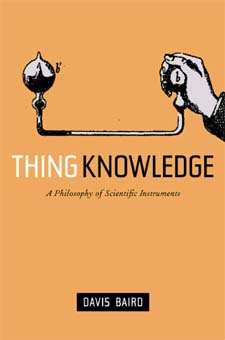 | Title: Thing knowledge: a philosophy of scientific instruments Author: Baird, Davis Published: University of California Press, 2004 Subjects: Philosophy | Technology and Society Publisher's Description: Western philosophers have traditionally concentrated on theory as the means for expressing knowledge about a variety of phenomena. This absorbing book challenges this fundamental notion by showing how objects themselves, specifically scientific instruments, can express knowledge. As he considers numerous intriguing examples, Davis Baird gives us the tools to "read" the material products of science and technology and to understand their place in culture. Making a provocative and original challenge to our conception of knowledge itself, Thing Knowledge demands that we take a new look at theories of science and technology, knowledge, progress, and change. Baird considers a wide range of instruments, including Faraday's first electric motor, eighteenth-century mechanical models of the solar system, the cyclotron, various instruments developed by analytical chemists between 1930 and 1960, spectrometers, and more. [brief] Similar Items |
| 19. |  | Title: Healing the masses: Cuban health politics at home and abroad Author: Feinsilver, Julie Margot Published: University of California Press, 1993 Subjects: Latin American Studies | Politics | Medicine | Public Policy Publisher's Description: How has Cuba, a small, developing country, achieved its stunning medical breakthroughs? Hampered by scarce resources and a long-standing U.S. embargo, Cuba nevertheless has managed to provide universal access to health care, comprehensive health education, and advanced technology, even amid desperate economic conditions. Moreover, Cuba has sent disaster relief, donations of medical supplies and technology, and cadres of volunteer doctors throughout the world, emerging, in Castro's phrase, as a "world medical power."In her significant and timely study, Julie Feinsilver explores the Cuban medical phenomenon, examining how a governmental obsession with health has reaped medical and political benefits at home and abroad. As a result of Cuba's forward strides in health care, infant mortality rates are low even by First World standards. Cuba has successfully dealt with the AIDS epidemic in a manner that has aroused controversy and that some claim has infringed on individual liberties - issues that Feinsilver succinctly evaluates.Feinsilver's research and travel in Cuba over many years give her a unique perspective on the challenges Cuba faces in this time of unprecedented economic and political uncertainty. Her book is a must-read for everyone concerned with health policy, international relations, and Third World societies. [brief] Similar Items |
| 20. | 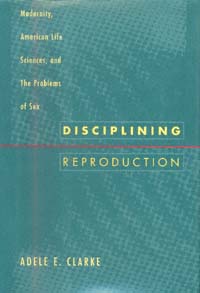 | Title: Disciplining reproduction: modernity, American life sciences, and "the problems of sex" Author: Clarke, Adele Published: University of California Press, 1998 Subjects: Sociology | Medical Anthropology | Medicine | American Studies | Gender Studies Publisher's Description: Reproductive issues from sex and contraception to abortion and cloning have been controversial for centuries, and scientists who attempted to turn the study of reproduction into a discipline faced an uphill struggle. Adele Clarke's engrossing story of the search for reproductive knowledge across the twentieth century is colorful and fraught with conflict.Modern scientific study of reproduction, human and animal, began in the United States in an overlapping triad of fields: biology, medicine, and agriculture. Clarke traces the complicated paths through which physiological approaches to reproduction led to endocrinological approaches, creating along the way new technoscientific products from contraceptives to hormone therapies to new modes of assisted conception - for both humans and animals. She focuses on the changing relations and often uneasy collaborations among scientists and the key social worlds most interested in their work - major philanthropists and a wide array of feminist and medical birth control and eugenics advocates - and recounts vividly how the reproductive sciences slowly acquired standing.By the 1960s, reproduction was disciplined, and the young and contested scientific enterprise proved remarkably successful at attracting private funding and support. But the controversies continue as women - the targeted consumers - create their own reproductive agendas around the world. Elucidating the deep cultural tensions that have permeated reproductive topics historically and in the present, Disciplining Reproduction gets to the heart of the twentieth century's drive to rationalize reproduction, human and nonhuman, in order to control life itself. [brief] Similar Items |